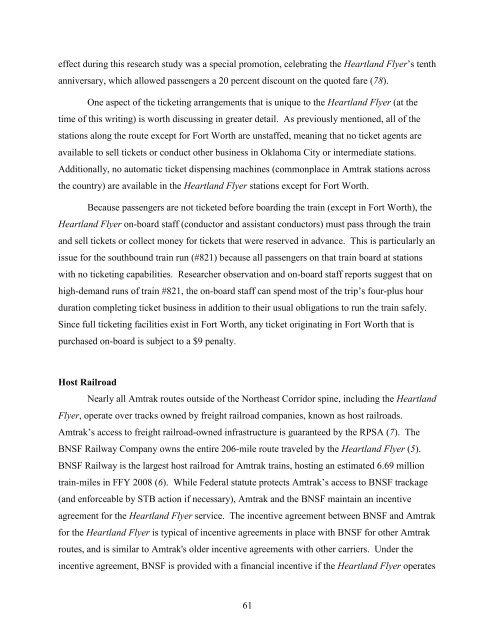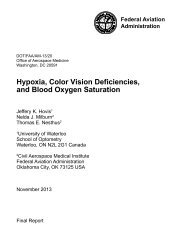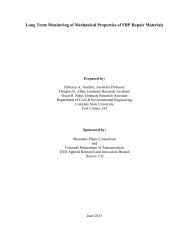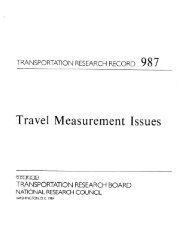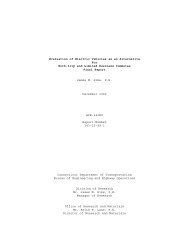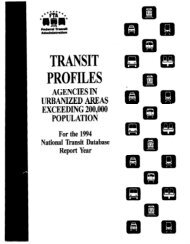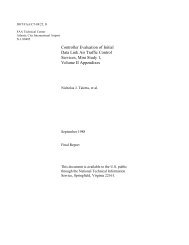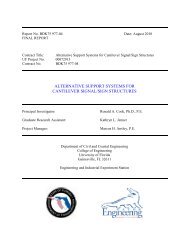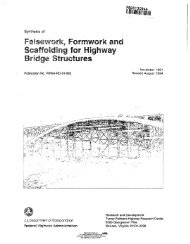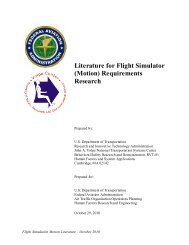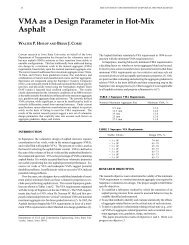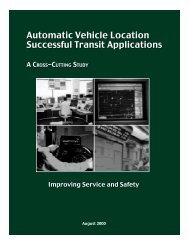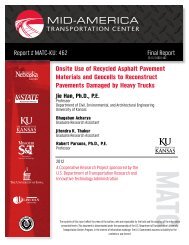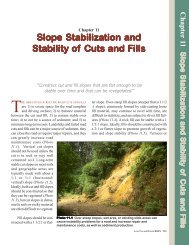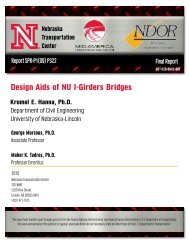Measuring the Benefits of Intercity Passenger Rail: A Study
Measuring the Benefits of Intercity Passenger Rail: A Study
Measuring the Benefits of Intercity Passenger Rail: A Study
You also want an ePaper? Increase the reach of your titles
YUMPU automatically turns print PDFs into web optimized ePapers that Google loves.
effect during this research study was a special promotion, celebrating <strong>the</strong> Heartland Flyer’s tenth<br />
anniversary, which allowed passengers a 20 percent discount on <strong>the</strong> quoted fare (78).<br />
One aspect <strong>of</strong> <strong>the</strong> ticketing arrangements that is unique to <strong>the</strong> Heartland Flyer (at <strong>the</strong><br />
time <strong>of</strong> this writing) is worth discussing in greater detail. As previously mentioned, all <strong>of</strong> <strong>the</strong><br />
stations along <strong>the</strong> route except for Fort Worth are unstaffed, meaning that no ticket agents are<br />
available to sell tickets or conduct o<strong>the</strong>r business in Oklahoma City or intermediate stations.<br />
Additionally, no automatic ticket dispensing machines (commonplace in Amtrak stations across<br />
<strong>the</strong> country) are available in <strong>the</strong> Heartland Flyer stations except for Fort Worth.<br />
Because passengers are not ticketed before boarding <strong>the</strong> train (except in Fort Worth), <strong>the</strong><br />
Heartland Flyer on-board staff (conductor and assistant conductors) must pass through <strong>the</strong> train<br />
and sell tickets or collect money for tickets that were reserved in advance. This is particularly an<br />
issue for <strong>the</strong> southbound train run (#821) because all passengers on that train board at stations<br />
with no ticketing capabilities. Researcher observation and on-board staff reports suggest that on<br />
high-demand runs <strong>of</strong> train #821, <strong>the</strong> on-board staff can spend most <strong>of</strong> <strong>the</strong> trip’s four-plus hour<br />
duration completing ticket business in addition to <strong>the</strong>ir usual obligations to run <strong>the</strong> train safely.<br />
Since full ticketing facilities exist in Fort Worth, any ticket originating in Fort Worth that is<br />
purchased on-board is subject to a $9 penalty.<br />
Host <strong>Rail</strong>road<br />
Nearly all Amtrak routes outside <strong>of</strong> <strong>the</strong> Nor<strong>the</strong>ast Corridor spine, including <strong>the</strong> Heartland<br />
Flyer, operate over tracks owned by freight railroad companies, known as host railroads.<br />
Amtrak’s access to freight railroad-owned infrastructure is guaranteed by <strong>the</strong> RPSA (7). The<br />
BNSF <strong>Rail</strong>way Company owns <strong>the</strong> entire 206-mile route traveled by <strong>the</strong> Heartland Flyer (5).<br />
BNSF <strong>Rail</strong>way is <strong>the</strong> largest host railroad for Amtrak trains, hosting an estimated 6.69 million<br />
train-miles in FFY 2008 (6). While Federal statute protects Amtrak’s access to BNSF trackage<br />
(and enforceable by STB action if necessary), Amtrak and <strong>the</strong> BNSF maintain an incentive<br />
agreement for <strong>the</strong> Heartland Flyer service. The incentive agreement between BNSF and Amtrak<br />
for <strong>the</strong> Heartland Flyer is typical <strong>of</strong> incentive agreements in place with BNSF for o<strong>the</strong>r Amtrak<br />
routes, and is similar to Amtrak's older incentive agreements with o<strong>the</strong>r carriers. Under <strong>the</strong><br />
incentive agreement, BNSF is provided with a financial incentive if <strong>the</strong> Heartland Flyer operates<br />
61


